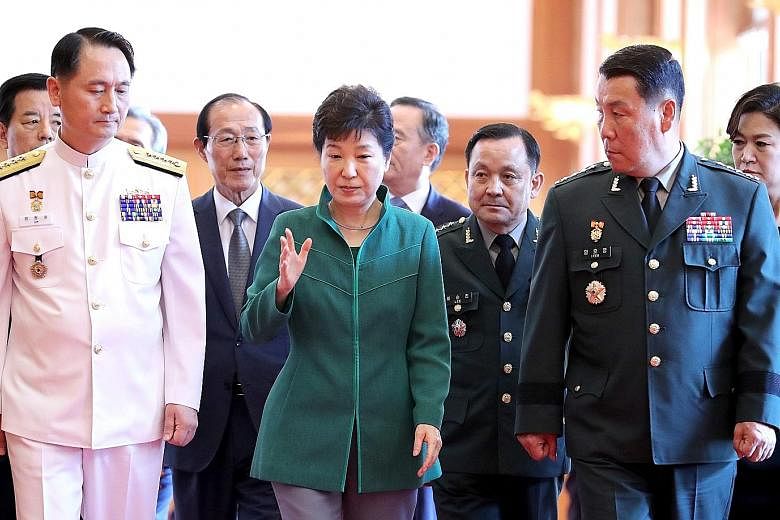South Korean President Park Geun Hye has renewed calls for new and strong international sanctions against North Korea, while pledging to take unilateral measures to curb the North's nuclear ambitions.
In a meeting with senior aides yesterday, she denounced Pyongyang for boasting about its nuclear development while its people suffer from the worst floods in decades.
She also warned of sudden provocations from the North, which she said "is not keen on denuclearisation talks any more". This underscores the need for the South to deploy the United States Terminal High Altitude Area Defence anti-missile system for protection, she said.
"Our government will do its best to secure new, strong international sanctions at the United Nations Security Council that could force the North into abandoning its nuclear programme," said Ms Park.
She did not specify how South Korea will take unilateral steps to pressure the North in tandem with other countries. But Seoul has ramped up pressure on Pyongyang since the regime conducted its latest nuclear test two weeks ago, its second in eight months.
The South Korean military has boosted its combat-readiness and Defence Minister Han Min Koo said on Wednesday there is a retaliation plan in place to "destroy" the North Korean leadership if Pyongyang launches an attack.
World leaders have condemned North Korea's provocations, and talks are under way to impose even more stringent sanctions on the regime after a UN Security Council resolution was adopted in March to cut off North Korea's access to foreign currency and tighten inspection of cargo to and from the country.
US President Barack Obama and Chinese Premier Li Keqiang, who met on the sidelines of the UN General Assembly on Monday, agreed to bolster cooperation in the Security Council and law enforcement channels in order to push the North towards denuclearisation.
But the North remains defiant. It conducted a ground test for a rocket engine on Tuesday, triggering speculation that it is preparing to launch an intercontinental missile capable of reaching the US.
Instead of diverting resources to help flood victims - more than 20,000 houses were destroyed and 138 people killed earlier this month - Pyongyang spent an estimated US$200 million (S$270 million) this year on two nuclear tests and 22 missile launches, South Korea's Foreign Ministry said.
Ms Jean H Lee, global fellow at Woodrow Wilson International Centre for Scholars, Washington, said North Korea is clearly forging ahead with its nuclear programme.
"So much of the nation's pride and identity is built around this programme as a powerful means to defend North Korea against what the people are told is American aggression. Regional powers trying to come up with a way to deal with this threat will need to take that into account," she said.

